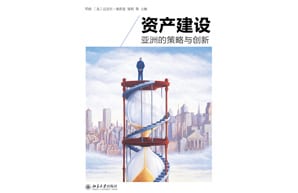The Center for Social Development (CSD) at Washington University in St. Louis recognizes that asset-building policies in Asia offer important lessons in lifelong wealth and retirement security. International interest in these policies, particularly regarding aging populations, has prompted a book published in Chinese and one forthcoming in English.
Both books were spurred by a conference called “Lifelong Asset Building: Strategies and Innovations in Asia,” held in November 2012 in Beijing, China, and organized by Washington University, Peking University and Hong Kong Polytechnic University. The National University of Singapore’s Centre for Social Development (Asia), Department of Sociology at Peking University and China Association for Social Work Education were co-sponsors.
The Chinese book, titled “Asset Building: Strategies and Policies in Asia,” is edited by Suo Deng, Michael Sherraden, Li Zou, Sibin Wang and Hok Bun Ku, and published by Peking University Press. It was available as of June 12.
The English version, titled “Asset Building Policies and Innovations in Asia,” will be published by Routledge in the United Kingdom later in 2014.
These books cover a wide variety of topics in asset building, including homeownership in East Asia; retirement security in Australia, Singapore and Malaysia; development of lower income children and families in Korea, Taiwan, and Hong Kong; community development strategies in post-disaster China; and asset-building innovations in Thailand and Mongolia.
The conference brought together scholars from 14 countries, including representatives from five McDonnell International Scholars Academy institutions: National University of Singapore, Peking University, Fudan University, National Taiwan University, and University of Hong Kong. In addition, two McDonnell Scholars wrote papers for the conference.
The conversation on asset building in Asia continued last month at a “Symposium on Asset Building, Anti-Poverty and Child Welfare Policy” held at Peking University in Beijing, organized by Peking University and Xinjiang University. CSD International Director Li Zou gave a presentation on international asset-building programs and policies as examples of new thinking in social policy. CSD Faculty Associate Baorong Guo presented results from the SEED for Oklahoma Kids experiment regarding effects of Child Development Accounts.
This June conference came at an opportune time for asset building in China. The country was exploring the possibility of establishing its first Child Welfare Act, which echoes the core element of asset building as a way to promote children’s long-term development. The Act would institute government subsidies, and could possibly support Child Development Accounts in China. The conference also highlighted asset-building programs and policies in Taiwan and Hong Kong. Scholars from the Xinjiang Region in western China presented local experiences in asset building and social development.
The conference received media attention in China, particularly among outlets focused on social work and research, including China Social Sciences Net, Chinese Social Work Research Center, Social Work China and Beijing College of Social Administration.
